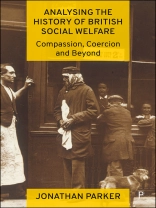This book offers insights into the development of social welfare policies by exploring the interconnections between policies and practice throughout history.
It challenges tacitly accepted arguments that favour particular approaches to welfare, such as conditionality and eligibility. It provides examples of enduring social assumptions which influence the way we perform social welfare, such as the equivocal position of women in social welfare and the unintended consequences of reforms such as Universal Credit.
By identifying continuities in welfare policy, practice and thought, it offers the potential for the development of new thinking, policy making and practice.
สารบัญ
1. Concepts, Continuities and Critique
2. A Brief History of British Social Welfare
3. Philosophical Binaries and Normative Judgements
4. Chocolate, Flowers and Social Welfare Reform
5. War: The Paradoxical Crucible of Welfare Reform
6. Gendered Perspectives on Welfare
7. Piacular Austerity: Sacrificing the Poor for the Rich
8. Universal Credit vs. Universal Basic Income: Strange Bedfellows?
9. Containing the Radicals and Regulating the ‘Other’: A History of the Strange Case of Social Work
10. W(h)ither Welfare After Brexit and COVID-19?
เกี่ยวกับผู้แต่ง
Jonathan Parker is Professor of Society & Social Welfare at Bournemouth University, UK, and University of Stavanger, Norway












